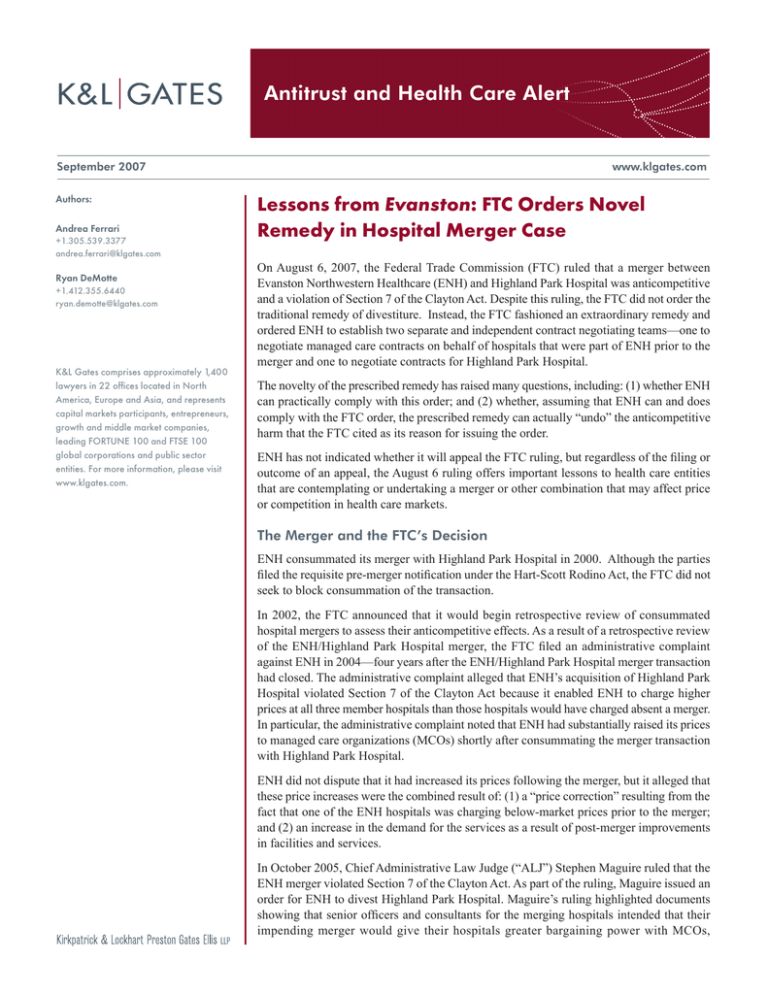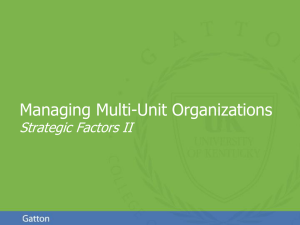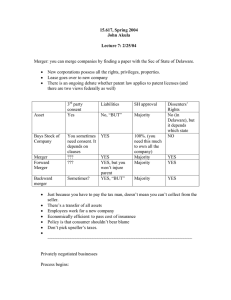
Antitrust and Health Care Alert
September 2007
Authors:
Andrea Ferrari
+1.305.539.3377
andrea.ferrari@klgates.com
Ryan DeMotte
+1.412.355.6440
ryan.demotte@klgates.com
K&L Gates comprises approximately 1,400
lawyers in 22 offices located in North
America, Europe and Asia, and represents
capital markets participants, entrepreneurs,
growth and middle market companies,
leading FORTUNE 100 and FTSE 100
global corporations and public sector
entities. For more information, please visit
www.klgates.com.
www.klgates.com
Lessons from Evanston: FTC Orders Novel
Remedy in Hospital Merger Case
On August 6, 2007, the Federal Trade Commission (FTC) ruled that a merger between
Evanston Northwestern Healthcare (ENH) and Highland Park Hospital was anticompetitive
and a violation of Section 7 of the Clayton Act. Despite this ruling, the FTC did not order the
traditional remedy of divestiture. Instead, the FTC fashioned an extraordinary remedy and
ordered ENH to establish two separate and independent contract negotiating teams—one to
negotiate managed care contracts on behalf of hospitals that were part of ENH prior to the
merger and one to negotiate contracts for Highland Park Hospital.
The novelty of the prescribed remedy has raised many questions, including: (1) whether ENH
can practically comply with this order; and (2) whether, assuming that ENH can and does
comply with the FTC order, the prescribed remedy can actually “undo” the anticompetitive
harm that the FTC cited as its reason for issuing the order.
ENH has not indicated whether it will appeal the FTC ruling, but regardless of the filing or
outcome of an appeal, the August 6 ruling offers important lessons to health care entities
that are contemplating or undertaking a merger or other combination that may affect price
or competition in health care markets.
The Merger and the FTC’s Decision
ENH consummated its merger with Highland Park Hospital in 2000. Although the parties
filed the requisite pre-merger notification under the Hart-Scott Rodino Act, the FTC did not
seek to block consummation of the transaction.
In 2002, the FTC announced that it would begin retrospective review of consummated
hospital mergers to assess their anticompetitive effects. As a result of a retrospective review
of the ENH/Highland Park Hospital merger, the FTC filed an administrative complaint
against ENH in 2004—four years after the ENH/Highland Park Hospital merger transaction
had closed. The administrative complaint alleged that ENH’s acquisition of Highland Park
Hospital violated Section 7 of the Clayton Act because it enabled ENH to charge higher
prices at all three member hospitals than those hospitals would have charged absent a merger.
In particular, the administrative complaint noted that ENH had substantially raised its prices
to managed care organizations (MCOs) shortly after consummating the merger transaction
with Highland Park Hospital.
ENH did not dispute that it had increased its prices following the merger, but it alleged that
these price increases were the combined result of: (1) a “price correction” resulting from the
fact that one of the ENH hospitals was charging below-market prices prior to the merger;
and (2) an increase in the demand for the services as a result of post-merger improvements
in facilities and services.
In October 2005, Chief Administrative Law Judge (“ALJ”) Stephen Maguire ruled that the
ENH merger violated Section 7 of the Clayton Act. As part of the ruling, Maguire issued an
order for ENH to divest Highland Park Hospital. Maguire’s ruling highlighted documents
showing that senior officers and consultants for the merging hospitals intended that their
impending merger would give their hospitals greater bargaining power with MCOs,
Antitrust and Health Care Alert
and would thereby result in ENH having the needed
“leverage” to raise prices. The evidence also included
certain post-merger statements by ENH officials,
including a statement by one ENH executive that:
transaction violated Section 7…they are relevant
to determining whether divestiture is appropriate
because divestiture may reduce or eliminate the
resulting benefits for a material period of time.
the larger market share created by adding
Highland Park Hospital has translated to better
managed care contracts… [S]ome $24 million
of revenue enhancements have been achieved,
mostly via managed care renegotiations…[N]one
of this could have been achieved by either
Evanston or Highland Park alone. The ‘fighting
unit’ of our three hospitals and 1600 physicians
was instrumental in achieving these ends.
The Commissioners acknowledged that a structural
remedy such as divestiture is ordinarily preferred over
a conduct remedy of the sort ordered for ENH, but
stated that the costs, including the potential loss to the
community if Highland Park Hospital had to forfeit its
cardiac surgery program and state of the art electronic
medical records system, warranted an alternative to a
structural remedy.
ENH appealed the ALJ’s ruling to the Commissioners
of the FTC. They affirmed that the ENH/Highland
Park Hospital merger was anticompetitive and illegal.
Like the ALJ, the Commissioners cited to pre- and
post-merger statements made by hospital officials and
consultants regarding the merger’s anticipated and
actual effect on ENH’s power to raise prices. They also
relied on econometric analyses of the merged hospitals’
pre-merger and post-merger prices, which demonstrated
a substantial increase in average net price per case
following the consummation of the merger, and, in the
opinion of the Commissioners, effectively ruled out
procompetitive and competitively neutral explanations
for the price increases, such as improved efficiency,
changes in patient mix or improvements in quality. The
Commissioners’ ruling explicitly notes the lack of any
evidence that improvements in quality or services were
communicated to patients or MCOs in the course of
contract negotiations, suggesting that communication
of improvements to the users and payors of services
would be required to reasonably support the argument
that ENH was able to raise its prices as a result of
increased demand due to improvements in quality or
services.
Although the Commissioners’ ruling affirmed that the
ENH/Highland Park Hospital merger was illegal, it did
not affirm the ALJ’s order for ENH to divest Highland
Park Hospital. Instead, the FTC ordered a “conduct
remedy,” stating:
ENH has integrated the operations of [its
merged hospitals] and has made substantial
improvements at Highland Park since the
merger. [Although] [t]he large majority of these
improvements would have occurred without the
merger, and therefore do not bear on whether the
The FTC analyzed the ENH/Highland Park Hospital
merger through the “consumer protection” lens of
antitrust law, and with careful consideration of the rather
unique aspects of the marketplace for hospital services.
For example, the ruling contains an interesting—if not
new—argument that transactions and arrangements
among health care providers warrant especially
intense scrutiny because the injury that may result
from anticompetitive conduct extends far beyond the
individuals who personally use the health care services.
When an entity such as ENH negotiates higher prices
with MCOs, those MCOs spread the cost of the higher
prices to all their enrollees, as well as to all employers
who purchase the MCO’s plans for their employees.
The result is that all consumers in a region—which
may be very large if certain MCOs serve employers
and enrollees over a large geographic area—may be
injured by the anticompetitive conduct.
Analysis and Lessons
The FTC May Bring a Merger Challenge
Before or After Consummation of a Merger
This ruling serves as a reminder that the FTC can and
may bring a merger challenge whenever it develops
evidence that the merger is harmful to consumers.
The fact that the FTC does not challenge a transaction
prior to the expiration of the waiting period under
the Hart-Scott-Rodino Act does not mean that the
transaction cannot later be challenged. As the Evanston
ruling demonstrates, this means that parties to a
merger transaction need to be mindful of the antitrust
implications of statements, conduct and pricing
behavior before, during and after consummation of
a merger.
September 2007 | Antitrust and Health Care Alert
Statements Concerning Competitive
Effects Made by the Merging Parties in the
Ordinary Course of Business Will Be Given
Substantial Weight
A pivotal consideration in the ENH ruling was the trail
of statements by ENH and Highland Park Hospital
officials indicating their merger was intended to, and did,
reduce competition, increase market power, generate
“leverage” to negotiate with MCOs, and increase
reimbursement rates. To withstand antitrust scrutiny,
a merger transaction among competing hospitals with
substantial market shares should be supported by clear
evidence of procompetitive enhancements in quality and
efficiency. Notwithstanding the post-merger increase in
prices, the ENH merger may have survived antitrust
scrutiny had there been well-documented evidence that
the intent and effect of the transaction was to improve
the quality, scope and efficient utilization of healthcare
services in a manner that the pre-merger entities could
not achieve independently.
The FTC Is Mindful of the Difficulty in
“Unscrambling Eggs”
Since announcing its retrospective review of hospital
mergers in 2002, the FTC has faced numerous
questions about the potential public harm that may
result if merged entities are suddenly ordered to “undo”
their merger after many years of unified operation. By
the Evanston ruling, the FTC clearly acknowledged
that divestiture may be ill-advised and contrary to the
public interest when many years have passed between
the consummation of the transaction and the conclusion
of antitrust litigation. However, although the ruling
acknowledges that a consummated merger that is
deemed illegal “after the fact” may not always warrant
an order for divestiture, it also stresses that “it is the
highly unusual case in which a conduct remedy, rather
than divestiture, is more appropriate.” In sum, the
FTC’s ruling in Evanston opens the door for alternative
remedies to divestiture, but it is not known whether
these alternative “conduct” remedies will become
common, whether they will be practicable, or whether
they can actually remedy the competitive harm.
In addition, there is no indication of whether ENH
will appeal the FTC’s ruling to a federal court, on
what grounds ENH may appeal, or what the outcome
of the appeal may be. Taken together, these questions
suggest that it may be some time before we have full
appreciation for what the Evanston decision means
for entities that face post-merger challenges brought
by the FTC. Consequently, there is considerable
incentive for health care entities to be mindful of
antitrust considerations in structuring and executing
transactions, and in dealing with payors after the
transaction, so as to avoid having to face the prospect
of a post-merger challenge and the difficult questions of
whether and how they may be required to “unscramble
their eggs.”
K&L Gates comprises multiple affiliated partnerships: a limited liability partnership with the full name Kirkpatrick & Lockhart Preston Gates Ellis LLP qualified
in Delaware and maintaining offices throughout the U.S., in Berlin, and in Beijing (Kirkpatrick & Lockhart Preston Gates Ellis LLP Beijing Representative
Office); a limited liability partnership (also named Kirkpatrick & Lockhart Preston Gates Ellis LLP) incorporated in England and maintaining our London
office; a Taiwan general partnership (Kirkpatrick & Lockhart Preston Gates Ellis) which practices from our Taipei office; and a Hong Kong general
partnership (Kirkpatrick & Lockhart Preston Gates Ellis, Solicitors) which practices from our Hong Kong office. K&L Gates maintains appropriate registrations
in the jurisdictions in which its offices are located. A list of the partners in each entity is available for inspection at any K&L Gates office.
This publication/newsletter is for informational purposes and does not contain or convey legal advice. The information herein should not be used or relied
upon in regard to any particular facts or circumstances without first consulting a lawyer.
Data Protection Act 1998—We may contact you from time to time with information on Kirkpatrick & Lockhart Preston Gates Ellis LLP seminars and with our
regular newsletters, which may be of interest to you. We will not provide your details to any third parties. Please e-mail london@klgates.com if you would
prefer not to receive this information.
©1996-2007 Kirkpatrick & Lockhart Preston Gates Ellis LLP. All Rights Reserved.
September 2007 |



